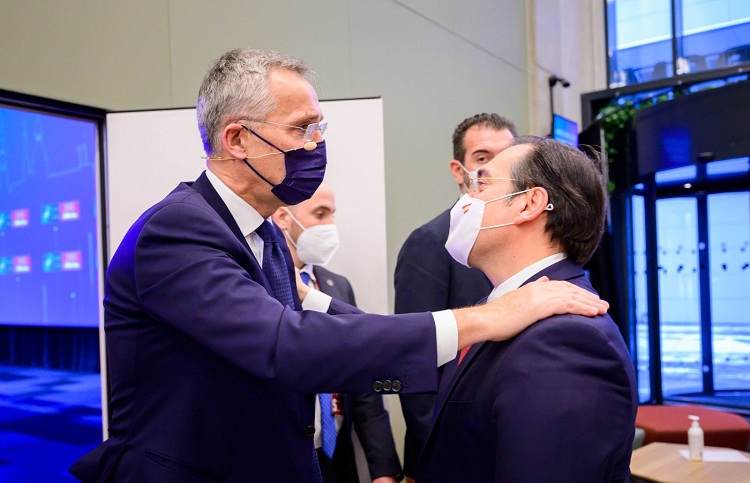Luis Ayllón
Trying to redirect relations with Morocco and preparing for the NATO Summit to be held in Madrid at the end of June are the main challenges facing the Minister of Foreign Affairs, José Manuel Albares, in the year 2022 that has just begun.
Since Pedro Sánchez arrived at La Moncloa in June 2018, following a motion of censure against Mariano Rajoy, there have been three ministers at the head of the Palace of Santa Cruz -Josep Borrel, Arancha González Laya and, now, José Manuel Albares-, which, according to analysts, is not, in principle, a fact that contributes to the desire to strengthen Spanish foreign policy, which must tackle important tasks in the coming months.
In any case, the current head of the portfolio, who began his tenure with success by managing the evacuation of Afghanistan, facilitating the vaccination of personnel working for the state abroad and unblocking the appointments of ambassadors that were stuck, has yet to resolve the crisis with Morocco, despite assurances from his department that relations are normalising.
The reality is that, since the conflict broke out following the reception of Polisario leader Brahim Ghali in a Spanish hospital, little progress has been made in restoring relations with the neighbouring country, despite the fact that, according to sources close to the minister, he speaks quite frequently with his Moroccan counterpart, Nasser Bourita.
In any case, these are telephone conversations, as the two have not yet met in person, and they have not borne fruit in the gesture that, from a diplomatic point of view, would make the normalisation of relations visible: the return to Madrid of the Moroccan ambassador, Karima Benyaich, who was recalled for consultations by Rabat last May, or her replacement by someone else.
On the contrary, and despite the proclamation made by Mohammed VI in August that an ‘unprecedented stage’ in bilateral relations would be opened, the reality is that Morocco never misses an opportunity to make the Spanish authorities uncomfortable, most recently by accusing Spain of being a ‘threat’ to the Moroccan population due to the ‘lack of compliance with health protocols against COVID-19’.
In addition, Morocco keeps the borders with Ceuta and Melilla closed and authorised the installation of a fish farm in the vicinity of the Chafarinas Islands, which prompted the Spanish government to complain in a note verbale after noting that it was operating in what are Spanish waters “without the necessary permits for this activity”.
In addition, Morocco recently signed a contract with the Israeli company Ratio Petroleum Energy to explore for oil and gas off the Saharawi coast near Dakhla, close to Spanish waters off the Canary Islands.
The government is aware that Mohammed VI is awaiting a declaration of support from Spain for his autonomy plan for Western Sahara, something the Spanish authorities have to be very careful about, because any step could provoke a reaction from Algeria, at a time when the supply of gas from that country could be endangered as a result of the confrontation between the two giants of the Maghreb.
This delicate situation has meant, among other things, that Albares is betting on keeping the Spanish ambassadors in Algiers and Rabat in their posts for a while longer. The former, Fernando Morán, has been in the post for less than three and a half years and will remain at least until 2023, but Ricardo Díez-Hochleitner arrived in Morocco in mid-2015, which means he has been in the post for six and a half years, a rather long time by Spanish diplomatic standards.
In addition to the Moroccan dossier, the other major task facing the Foreign Minister is to prepare, together with the Minister of Defence, Margarita Robles, the NATO Summit to be held in Madrid on 29 and 30 June, twenty-five years after another one that was also held in the Spanish capital in 1997, and on the fortieth anniversary of Spain’s entry into the Atlantic Alliance.
The aim of the Summit is to update NATO’s Strategic Concept, which was approved in Lisbon ten years ago, in order to adapt its guidelines to the new world scenario. The importance of the meeting is clear to everyone, at a time when Vladimir Putin’s Russia is increasingly tightening the noose, with its pressure on Ukraine and its intervention in some of the former Soviet Union republics, such as Belarus and Kazakhstan.
In addition, the Allied Summit will be the opportunity for Joe Biden’s first visit to Spain as President of the United States, something that the head of the Spanish government, Pedro Sánchez, hopes to capitalise on to reinforce his image.
Alongside these two major issues, the Ministry of Foreign Affairs must continue preparations for Spain’s six-month presidency of the EU in the second half of 2023. The preparations suffered a serious setback after Albares decided to dismiss Juan González-Barba as Secretary of State for the EU, after the discrepancies in the way they functioned became evident.
In spite of everything, it does not appear that there will be any major changes in direction, because the post that González-Barba is leaving has been taken over by Pascual Navarro, who was part of his team, as Secretary General of the EU and whose main task was precisely to prepare for the Presidency.







